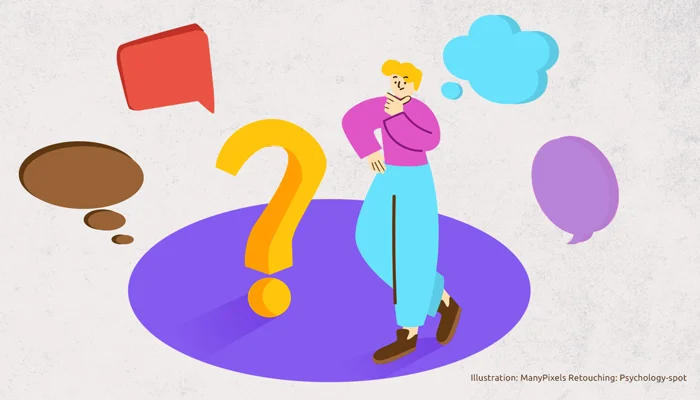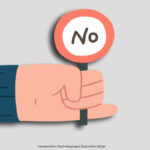
We all make mistakes. We all also try to excuse them. And when we do, we run the risk of falling into self-justification bias. As Antoine de Saint-Exupéry wrote: “It is much more difficult to judge oneself than it is to judge others. If you can judge yourself, you are truly wise.” But we don’t always succeed. In fact, we often resort to self-deception and pretexts.
What is self-justification bias and why do we fall into it?
In 1957, Leon Festinger published his theory of cognitive dissonance. He explained that when we experience dissonance, a negative emotional response is generated that motivates us to eliminate that source of distress. Resorting to defense mechanisms and cognitive biases is one of the simplest and most common ways to bury this incongruence.
Self-justification bias is a psychological mechanism that helps us reduce the dissonance and distress we feel while preserving our image and protecting our ego. Basically, when we make a mistake, we resort to arguments that allow us to rationalize our decision and justify our behavior.
For example, if we believe that we are careful and committed at work, but we make a mistake because we found the task tedious, we are likely to look for a scapegoat or blame it on external factors. In this way we are not forced to recognize that, when something does not interest us, our level of commitment, attention and care plummets.
The self-justification bias allows us to avoid or reduce the feeling of having done something wrong or the need to recognize that perhaps the image we have of ourselves is not as accurate and positive as we imagine or would like.
The trap of constantly justifying ourselves
When looking for excuses for our behaviors, we can follow two different strategies:
• Internal self-justification. It consists of changing the way we perceive our decisions and actions to better tolerate negative results and reduce their psychological impact. We can change our attitude, invent another reason, trivialize the negative consequences of our behavior or even deny them. For example, a smoker may tell himself that cigarettes are actually not that bad for his health, and a dieter may convince himself that he will then burn those extra calories at the gym – even if he never does.
• External self-justification. In this case, we resort to external excuses to justify our actions with the aim of shifting our responsibility to another person or group, generally to cover up a lack of self-control or simply a bad decision. A person who has problems with alcohol might say that it is their friends who encourage them to drink, and someone on a diet might blame it on the delicious pastry they find on their way to work.
However, at the base of both strategies is our confirmation bias, which implies a predisposition to focus only on information that supports our beliefs. In other words, since we want to maintain a positive image of ourselves, we will not analyze what happened objectively but rather we will focus on what allows us to justify our mistake.
The problem is that, even if we protect our ego, seeking justifications – whether internal or external – prevents us from growing. If we do not openly acknowledge our mistakes, but instead try to hide them – even from ourselves by resorting to the mechanism of rationalization – we will not be able to learn from them. And if we don’t learn the lesson, it is likely that sooner or later we will stumble over the same stone again.
Seeking external justifications for our actions blocks necessary change because it prevents us from taking responsibility for our attitudes. On the other hand, internal justifications make us blind to our weaknesses, preventing us from strengthening them.
In fact, self-justification bias keeps us tied to a rigid ego. It prevents us from realizing that we are changing and that perhaps we are not the person we think we are or from realizing that we still have a long way to go to become who we want to be.
The danger of becoming too lax
In 1958, psychologist Judson Mills devised a very interesting experiment whose results were thought-provoking. He subjected a class of students to an exam that was impossible to pass without cheating.
Before the test, he assessed each student’s attitudes toward cheating. Then, he gave them the test and let them do it unsupervised, but with a hidden camera in the classroom. In the end, Mills reanalyzed each student’s attitude toward cheating and found that those who had cheated showed a more forgiving attitude.
The students who cheated changed their thinking by saying, “Cheating is not that bad” and justified their behavior with phrases like: “I had to copy to win the prize.”
On the other hand, the students who did not resort to these tricks reaffirmed their attitude against deception and cheating.
This study, a clear example of self-justification bias, shows us that when we engage in behavior that we consider negative or reprehensible, we tend to justify ourselves to feel better and reduce cognitive dissonance.
It also hints at the potential dangers of self-justification: those who engage in unethical behavior may become increasingly tolerant of such behavior and feel more comfortable with their actions. That is the reason why corruption or violence increases by leaps and bounds: those who commit these acts become accustomed to them and justify them.
How to avoid falling into self-justification bias?
Self-justification feeds on memories, which are “pruned” and shaped to reinforce our confirmation bias. That is, we often engage in revisionist history to reduce our guilt and distance ourselves from the negative, so that we can confirm our biased version of events.
Therefore, we must remain attentive to this psychological mechanism, being aware that our memory is not a warehouse where we keep our memories in their entirety, but rather it is a process that is constantly changing. That means that if we have made a mistake, we must look to the past to find the point where we failed.
The key lies in the attitude with which we undertake this process of evaluating what happened. If we approach our decisions and actions with the desire to learn, we will not look for excuses but rather opportunities to improve.
And for that, we need to calm the ego. We need to realize that our “self” of yesterday is not necessarily our “self” of today and probably will not be our “self” of tomorrow. We are constantly evolving, so past mistakes do not have to define us as people.
In this way we will prevent emotions from taking control and pushing us to look for excuses, which will only serve to commit us more and more to those bad decisions and make us more lax when it comes to judging ourselves. The best antidote to self-justification bias is to understand that some situations arise from specific decision errors that do not necessarily define us as people. Learning the lesson will allow us to grow. Looking for excuses will sink us.
References:
Klein, J. & McColl, G. (2019) Cognitive Dissonance: How Self-Protective Distortions Can Undermine Clinical Judgment. Med Educ; 53(12): 1178-1186.
Goethals, G. R. (1992) Dissonance and Self-Justification. Psychological Inquiry; 3(4): 327-329.
Merelman, R. M. (1986) Domination, Self-Justification, and Self-Doubt: Some Social-Psychological Considerations. The Journal of Politics; 48(2): 276-300.Mills, J. (1958) Changes in moral attitudes following temptation. Journal of Personality; 26(4): 517-531.



